I play EUnified, you?
I play EUnified, you?


Funded by the European Union. Views and opinions expressed are howeverthose of the author(s) only and do not necessarily reflect those of theEuropean Union or the European Education and Culture Executive Agency(EACEA). Neither the European Union nor EACEA can be held responsible for them.
I play EUnified, you? – 101090613 — IPEU
Data di inizio: 01 dicembre 2022
Data di fine: 31 maggio 2024
Finanziamento: 60.000 EUR
IL PROGETTO
Il progetto è finanziato dalla call Partenariati di collaborazione su piccola scala nell’ambito dello Sport Erasmus Plus, secondo le regole del Programma Erasmus Plus. “IPEU” avrà l’obiettivo generale di incoraggiare il coinvolgimento e la partecipazione nelle attività sportive unificate di giovani con disabilità intellettiva (DI) dagli 8 ai 12 anni e migliorare la loro inclusione in ambienti sportivi dove giovani con e senza DI convivono e imparano a conoscersi. Gli obiettivi specifici sono: aumentare la conoscenza dei giovani di 8-12 anni con DI e delle loro famiglie riguardo alle buone pratiche di integrazione dei giovani con DI, e delle organizzazioni locali e internazionali che offrono attività sportive unificate per persone con DI; fornire maggiori opportunità alle persone con DI di provare diversi sport unificati e approfondire come adattare i vari sport alle loro necessità e desideri; ridurre preconcetti e pregiudizi riguardo all’impossibilità delle persone con DI di partecipare alle attività sportive allo stesso livello dei loro coetanei senza DI.
ABOUT THE PROJECT
The project will be an Erasmus Plus Sport Small Collaborative partnerships, according to Erasmus Plus Programme rules.
“IPEU” will have the general objective of encouraging the involvement and participation in unified sport activities of young people with ID from 8 to 12 years old and enhance theIR inclusion in sport environments where young people with and without ID coexist and learn to know each other. The specific objectives are: to increase the knowledge of 8-12 years old with ID and their families about good practices of integration of young people with ID, and local and international organizations that offer unified sport activities for people with ID; to provide more opportunities for people with ID to try different unified sports and deepen how to adapt different sports to their necessities and desires; to reduce preconceptions and prejudices about the impossibility of people with ID to participate in sport activities on the same level as their peers without ID.
PARTNERSHIP
LEAD PARTNER: 3M TRAINING LAB
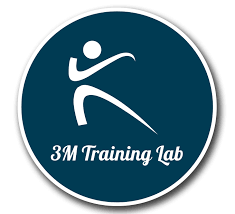
La 3M Training Lab, esperta nella programmazione dell’allenamento, ginnastica posturale, EMS e home training, è composta da personale laureato, altamente qualificato nell’ambito del benessere fisico. Si occupa di svolgere lezioni individuali per garantire un servizio esclusivo e personalizzato, in base alle esigenze e agli obiettivi che si vogliono raggiungere.
L’ associazione, riconosciuta dal CONI, collabora con diverse società e strutture nel territorio di Roma e dei Castelli Romani, svolge corsi di alta formazione, tenuti da Docenti Universitari ed esperti del settore, progetti europei finalizzati alla promozione dell’attività fisica ed eventi nazionali.
The 3M Training Lab, an expert in training programming, postural gymnastics, EMS and home training, is staffed by university graduates, highly qualified in the field of physical well-being. It provides individual lessons to guarantee an exclusive and customised service, based on the needs and goals to be achieved.
The association, which is recognised by CONI (Italian National Olympic Committee), collaborates with various companies and facilities in the Rome and Castelli Romani area, holds advanced training courses held by university lecturers and experts in the sector, European projects aimed at promoting physical activity, and national events.
SOS EUROPA

SOS EUROPA è una associazione indipendente di promozione sociale con sede a Roma, nata dall’entusiasmo dei suoi volontari per i valori europei avente come missione primaria il sostegno all’integrazione dei giovani dentro e fuori l’Unione Europea.
SOS Europa promuove e incoraggia da sempre lo scambio di culture, conoscenze ed esperienze: per questo motivo è molto attiva nel programma quadro Erasmus plus sia come ente applicante di progetti che come partner in scambi e progetti internazionali. Inoltre, da diversi anni diffonde le politiche europee nel settore gioventù grazie ai numerosi corsi che organizza frequentemente, cui partecipano esponenti di differenti realtà che lavorano a contatto con i giovani provenienti da tutto il territorio nazionale.
SOS Europa da diversi anni lavora a Roma e nel resto d’Italia per diffondere quei valori in che l’Unione Europea diffonde nel settore gioventù. Le loro attività hanno promosso l’integrazione tra molti ragazzi che si sono trovati a vivere a Roma pur provenendo da contesti estremamente differenti. SOS Europa è stata, come accade in molte realtà di volontariato, incubatore di esempi virtuosi di integrazione sociale.
SOS EUROPA is an independent association of social promotion based in Rome, born from the enthusiasm of its volunteers for European values with the primary mission of supporting the integration of young people inside and outside the European Union.
SOS Europa has always promoted and encouraged the exchange of cultures, knowledge and experiences: this is why it is very active in the Erasmus plus framework programme both as an implementing body for projects and as a partner in international exchanges and projects. Moreover, for several years it has been disseminating European policies in the youth sector thanks to the numerous courses it frequently organises, attended by representatives of different realities working in contact with young people from all over the country.
SOS Europa has been working for several years in Rome and in the rest of Italy to disseminate those values that the European Union disseminates in the youth sector. Their activities have promoted integration among many young people who have found themselves living in Rome despite coming from very different backgrounds. SOS Europa has been an incubator of virtuous examples of social integration, as is the case in many volunteer realities.
EUEXIA
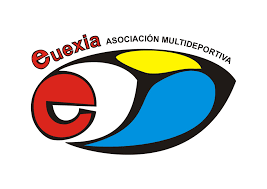
Euexia è un’associazione no-profit, fondata nel 2007 da un gruppo di amici amanti dello sport. Da allora l’associazione è stata coinvolta in un numero sempre maggiore di progetti, diventando un’entità multidisciplinare, soprattutto grazie al gruppo umano che lavora nell’organizzazione: persone giovani e qualificate altamente motivate.
Un altro dei suoi obiettivi principali è quello di offrire ai giovani della nostra regione opportunità di mobilità a livello europeo: programmi europei di mobilità (Corpo Europeo di Solidarietà), Erasmus+ (scambi giovanili, corsi di formazione, offerte di lavoro, borse di studio, ecc. ….).
In breve, l’organizzazione opera principalmente in tre diversi settori: sport, giovani e disabilità, per cui la maggior parte dei suoi progetti e delle sue attività si concentrano su di essi.
Euexia is a non-profit association, founded in 2007 by a group of sports-loving friends. Since then, the association has been involved in an increasing number of projects, becoming a multidisciplinary entity, mainly thanks to the human team working in the organisation: highly motivated young and qualified people.
Another of its main objectives is to offer young people in our region mobility opportunities at European level: European mobility programmes (European Solidarity Corps), Erasmus+ (youth exchanges, training courses, job offers, scholarships, etc. ….).
In short, the organisation works mainly in three different areas: sport, youth and disability, so most of its projects and activities focus on them.
ARTEAM
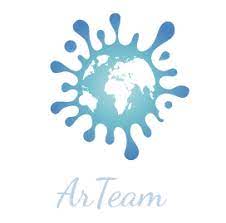
“ArTeam” Bulgaria è un’associazione giovanile fondata nel 2016 a Sofia, in Bulgaria, come iniziativa giovanile locale con l’obiettivo di creare una piattaforma per lo sviluppo di progetti, attività, partenariati e programmi per i giovani, i volontari e gli operatori giovanili che daranno loro l’opportunità di essere attivi nelle loro comunità, di apprendere nuove abilità e competenze e di acquisire esperienze e conoscenze per lo sviluppo personale e professionale.
La nostra missione è mettere in contatto persone attive e avventurose, promuovere l’apprendimento non formale e permanente nella nostra società e sostenere progetti innovativi e di qualità che rispondano alle esigenze dei giovani. Nel processo di apprendimento non formale i giovani possono imparare dalle loro esperienze e realizzare il loro vero e autentico sé e i loro desideri. Saranno in grado di costruire e riconoscere i veri valori della vita, di sviluppare le abilità e le competenze necessarie al di fuori del quadro dell’istruzione formale e di migliorare il livello delle competenze chiave e delle abilità degli operatori e dei leader giovanili.
“ArTeam” Bulgaria is a youth association established at 2016 in Sofia, Bulgaria, as a local youth initiative with the aim to create a platform for development of projects, activities, partnerships and programs for youngsters, volunteers and youth workers which will give them opportunity to be active in their communities, learn new skills and competences, and gain experience and knowledge for personal and professional development.
Our mission is to connect active adventurous people together, to promote non-formal and life-long learning among our society and to support quality and innovative projects that match the needs of young people. In the process of non-formal learning young people can learn from their experience and realize their true and authentic self and desires. They will be able to build and acknowledge the true values of life, to develop necessary skills and competencies outside the framework of formal education, and to improve the level of key competences and skills of youth workers and leaders.
SOCIAL MEDIA
KICK OFF MEETING
28 febbraio 2023
Il 28 febbraio il nostro progetto ha avuto il suo primo evento online. È stata l’occasione per incontrare i nostri partner e discutere i punti chiave del progetto. Con la partecipazione dei nostri partner, durante questo incontro abbiamo esaminato insieme i documenti. Ogni partner ha ricevuto una bozza del diagramma GANNT con la struttura delle attività del progetto ordinate per scadenza. Il Kick-off meeting online è stata la prima occasione iniziale per incontrarsi e iniziare a collaborare alle attività del progetto. Durante l’incontro abbiamo sviluppato una strategia chiara e condivisa per raggiungere gli obiettivi del progetto.
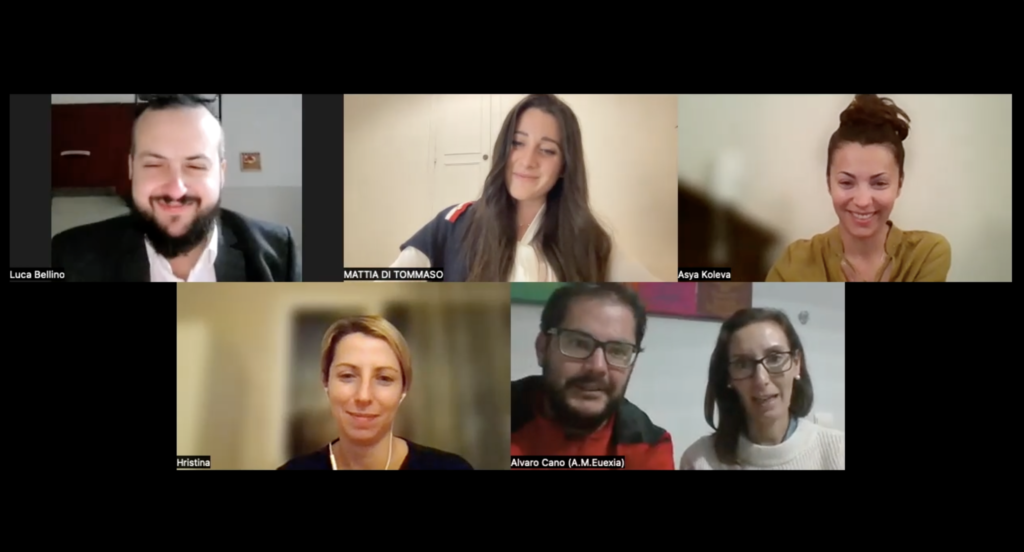
Qui i rappresentanti dell’organizzazione hanno analizzato congiuntamente gli obiettivi e fissato le scadenze. Il coordinatore del progetto (nel KOM) ha presentato il Registro dei rischi, un documento che identifica tutti i rischi potenziali, la loro probabilità di accadimento e la gravità del loro impatto sul progetto quando si verificano e definisce le strategie aggiuntive per gli eventi avversi.
Siamo entusiasti di iniziare a lavorare su questo progetto e sulle sue attività e non vediamo l’ora di incontrare i nostri partner a Frascati il prossimo giugno!
KICK OFF MEETING
February 28th February 2023
On February 28th our project had its very first event online. This was the opportunity to meet our partners and discuss about the key points of the project. With the participation of our partners, we reviewed the documents together during this meeting. Here, each partner received a draft GANNT diagram with the project activity structure sorted by deadline. The online Kick-off meeting was the first initial occasion to meet and start collaborating to work on the activities of the project. During the meeting we developed a clear and shared strategy for achieving project objectives.
Here, representatives of the organisation jointly analysed goals and set deadlines. The project coordinator (in the KOM) presented a Risk Register, a document that identifies all potential risks, their likelihood of occurrence and the severity of their impact on the project when they occur and sets out Additional Strategies for Adverse Events.
We are excited to start working on this project and its activities and look forward to meeting our partners in June in Frascati, where our summer camp will take place!
Ricerca sullo stato dell’arte del rapporto tra giovani con disabilità intellettiva e sport
Nella prima fase del progetto, le organizzazioni partner hanno collaborato per preparare una ricerca in tutte le lingue dei partner e in inglese sulle attuali migliori pratiche nel campo dell’integrazione delle persone con disabilità intellettiva all’interno delle attività sportive dei tre Paesi partner (Italia, Spagna e Bulgaria), con particolare attenzione alle particolari metodologie implementate per garantire l’integrazione e alle principali sfide affrontate dalle persone con disabilità intellettiva e dalle persone non disabili mentre sono coinvolte in attività sportive insieme. La ricerca si è anche concentrata sul modo in cui le famiglie sono coinvolte nel processo di decisione dei loro figli sullo sport da praticare.
Questo è stato il risultato: una collezione di buone pratiche.
Research on the State of Art of the combination of intellectual disabled young people and sports
In the first phase of the project, the partner organisations cooperated to prepare a research in all the partner languages and in English about the current best practices in the field of integration of people with intellectual disabilities within the sport activities of the 3 partner countries (Italy, Spain and Bulgaria) with focus on the particular methodologies implemented to guarantee integration and the main challenges faced either by intellectual disabled people and not-disabled people while being involved in sport activities together. The research also focused on how families are involved in the process of the decision of their children on the sport to take.
This has been the result: a collection of good practices.
SUMMER CAMP A FRASCATI
Frascati, 28 e 29 Giugno 2023
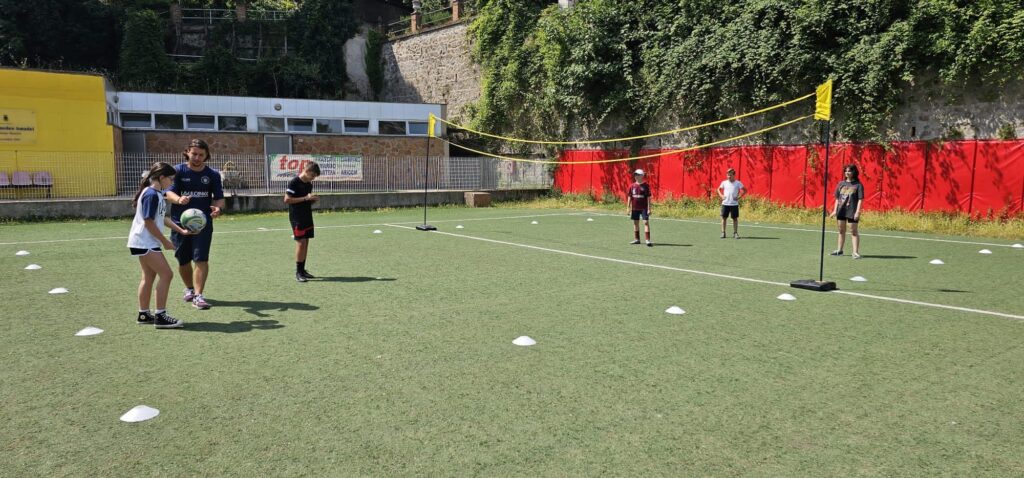
25 ragazzi tra gli 11 e i 13 anni, 7 educatori tra trainer sportivi e facilitatori.Queste le forze in campo per il nostro summer camp per il progetto “ipeu” che si è svolto a Frascati (roma) il 28 e il 29 giugno.Durante l’implementazione i ragazzi hanno avuto l’opportunità di ragionare e praticare gli sport inclusivi. Il team di fc frascati si è impegnato nel preparare dei percorsi sportivi che potessero includere tutti i ragazzi senza però annullare le differenze culturali. Per gli educatori invece si sono svolte sessioni di discussione sul tema dello sport come strumento di inclusione e sugli strumenti da usare per preparare i ragazzi ad affrontare le sfide sociale durante la pratica degli sport preferiti.
Utilizzando la metodologia del Design Thinking, i giovani partecipanti si sono impegnati in un processo creativo per co-creare linee guida per gli sport unificati. Il risultato tangibile di questo processo è stato lo sviluppo di linee guida dettagliate per gli sport unificati. Ogni sport praticato durante il campo estivo è stato analizzato in dettaglio per valutarne l’idoneità e l’accessibilità. Le linee guida risultanti sono il prodotto delle intuizioni e dei suggerimenti dei partecipanti, per garantire che siano pratiche e fondate sull’esperienza del mondo reale.
Potete consultare qui le linee guida nella lingua di ogni partner:
Le linee guida sviluppate durante il campo estivo saranno integrate nel lavoro quotidiano delle organizzazioni partner, ampliando la portata dei programmi sportivi unificati. Si prevede che questa iniziativa aumenti l’interesse e la partecipazione dei giovani e delle loro famiglie, garantendo che i loro figli si impegnino in attività sportive pensate e inclusive.
Un grazie speciale al nostro team DI 3M Training Lab al team di EUEXIA (SPAGNA) E DI ARTEAM (BULGARIA).
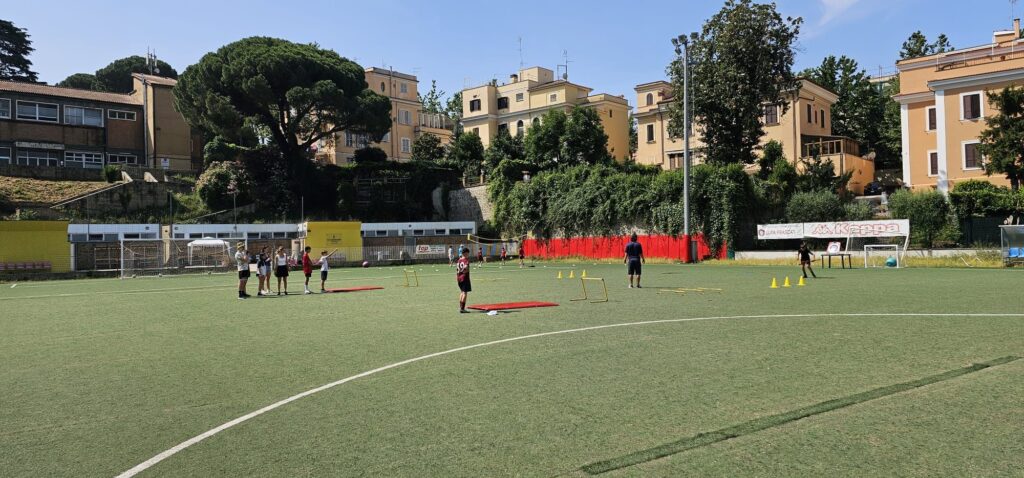
SUMMER CAMP IN FRASCATI
Frascati, 28 & 29 June 2023
25 kids between 11 and 13 years old, 7 educators including sports trainers and facilitators. These are the forces at work for our summer camp for the “ipeu” project which took place in Frascati (Rome) on 28 and 29 June. During the implementation, the kids had the opportunity to think and practice inclusive sports. The 3M Training Lab team is committed to preparing sports courses that could include all the kids without canceling cultural differences. For educators, however, discussion sessions were held on the theme of sport as a tool for inclusion and on the tools to be used to prepare children to face social challenges while practicing their favourite sports.
Utilising the Design Thinking methodology, the young participants engaged in a creative process to co-create guidelines for unified sports. The tangible outcome of this process was the development of detailed guidelines for unified sports. Each sport practiced during the summer camp was analyzed in detail to assess its suitability and accessibility. The resulting guidelines are a product of the participants’ insights and suggestions, ensuring they are practical and grounded in real-world experience.
You can check the guidelines here in every partner’s language:
The guidelines developed during the summer camp will be integrated into the daily work of partner organizations, expanding the reach of unified sports programs. This initiative is expected to increase interest and participation among young people and their families, providing assurance that their children are engaging in thoughtfully designed and inclusive sports activities.
Special thanks to our 3M Training Lab team, EUEXIA (SPAIN) AND ARTEAM (BULGARIA) team.
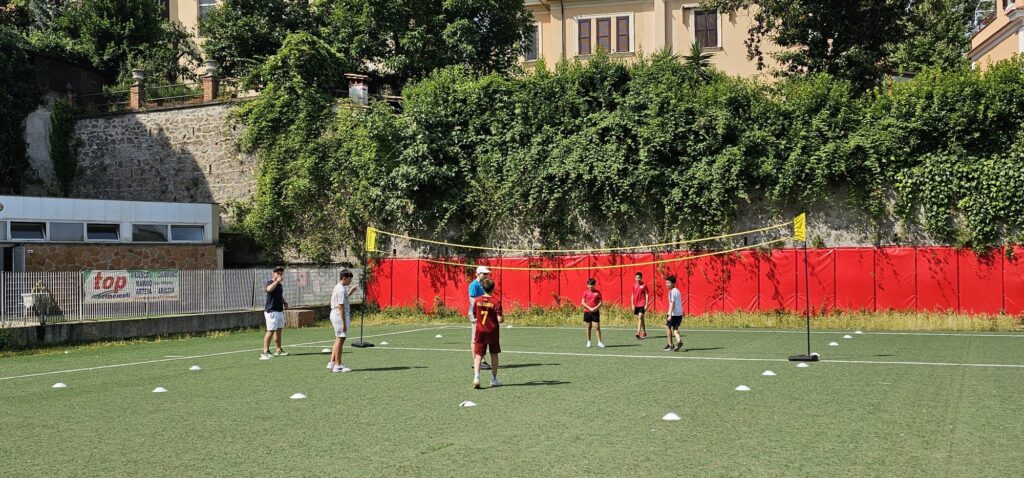
Mappatura delle organizzazioni nazionali che offrono attività di sport unificato
Ogni organizzazione partner ha fatto una ricerca nazionale con l’obiettivo di facilitare le famiglie di giovani con disabilità intellettiva l’accesso a organizzazioni che offrono opportunità di sport unificato, preparando una mappatura delle organizzazioni che offrono attività di sport unificato. Questo lavoro è disponibile sia in un documento scritto che integrato in una mappa interattiva.
Mapping of national organisations offering unified sport activities
Each partner organisation has done a national research with the aim of facilitating families of young people with intellectual disabilities access to organisations offering unified sport opportunities by preparing a mapping of organisations offering unified sport activities. This work is available both in a written document and integrated in an interactive map.
SEGUICI SUI SOCIAL PER ESSERE AGGIORNATO!/ TO BE UPDATED FOLLOW US ON THE SOCIAL MEDIA!
Trova tutti i link qua:
Find the links bellow:
Interviste sugli Sport Unificati
Il nostro progetto ha voluto dare grande importanza e visibilità alle testimonianze di giovani con e senza disabilità intellettiva già impegnati negli sport unificati a livello europeo, per fare luce sugli sport unificati e fare in modo che attraverso le storie dei protagonisti sia possibile da un lato incoraggiare la partecipazione a questo tipo di sport e dall’altro ridurre i preconcetti e i pregiudizi sull’impossibilità delle persone con disabilità intellettiva di partecipare ad attività sportive allo stesso livello dei loro coetanei senza disabilità intellettiva. Per questo motivo, abbiamo creato un canale su YouTube e Instagram, due piattaforme oggi molto utilizzate da molti giovani in Europa, chiamato “Io gioco unificato, e tu?” e tutti i partner hanno realizzato interviste (dal vivo e registrate) con giovani con e senza disabilità intellettiva impegnati nel campo degli sport unificati. Allo stesso tempo, è stato aperto un profilo Facebook con lo stesso titolo e su questo profilo sono state condivise notizie e storie dal mondo degli sport unificati.
Per guardare le interviste, potete cliccare su questi link:
Interviews on Unified Sports
Our project wanted to give a great importance and visibility to the testimonies of young people with and without intellectual disabilities who are already involved in unified sports at European level in order to shed some light on unified sports and to make sure that through the stories of the protagonists it is possible on the one hand to encourage participation in these types of sports and on the other hand toreduce preconceptions and prejudices about the impossibility of people with intellectual disabilities toparticipate in sport activities on the same level as their peers without intellectual disabilities. Therefore, we have created a channel on YouTube and Instagram, two platforms widely used nowadays by many young people in Europe, called “I play unified, and you?” and all partners, were conducting interviews (live and recorded) with young people with and without intellectual disabilities involved in the field of Unified Sports. At the same time, a Facebook profile with the same title was opened and on this profile news and stories from the world of unified sports has been shared.
You can check the interviews clicking here:
CLOSING MEETING A SOFIA, BULGARIA
Giovedì 14 marzo si è svolto a Sofia l’incontro conclusivo di “IPEU: I play Eunified, you?” si è svolto a Sofia, in Bulgaria. In generale, il progetto si concentra sulle attività di sport unificato con bambini con e senza disabilità intellettiva tra gli otto e i dodici anni. I nostri gruppi target, oltre ai bambini, erano i genitori, gli insegnanti e gli allenatori che potrebbero lavorare in contesti di sport unificati.
Due membri di ciascuna delle organizzazioni 3M Training Lap e SOS Europa dall’Italia, EUEXIA dalla Spagna e Arteam dalla Bulgaria si sono incontrati a Sofia, dove l’organizzazione locale, Arteam, ha accolto il gruppo. La giornata è iniziata con un’attività introduttiva per riprendere il tema dell’integrazione. Ogni partecipante aveva una disabilità specifica in base alla quale doveva agire. Tra queste, l’impossibilità di muovere le mani, gli occhi o la voce. Il compito consisteva nel costruire un’automobile con pezzi di carta bianca. Grazie alla cooperazione e al lavoro di squadra, entrambe le squadre sono riuscite a portare a termine il compito con risultati molto diversi.

Dopo la prima attività, si è tornati a parlare dei principali risultati del progetto. Oltre alle attività, come i campi estivi per bambini con e senza disabilità intellettiva, i risultati includono anche una sintesi dello stato dell’arte sullo sport integrato per le persone con disabilità intellettiva e interviste a bambini, allenatori, educatori e volontari che hanno preso parte al progetto da tutte le organizzazioni partecipanti. Per aggiungere altre prospettive a questa raccolta, i membri di ogni organizzazione si sono riuniti in gruppi misti e hanno pianificato, preparato e filmato le proprie interviste. In questo modo, abbiamo avuto la possibilità di condividere contemporaneamente il loro punto di vista con un partner di un altro Paese, di parlare delle nostre esperienze personali con il progetto e di creare legami individuali con i nostri partner.
Dopo che tutti i tandem hanno finito di filmare le loro interviste, queste sono state condivise con l’intero gruppo. Da un lato, il contenuto delle interviste ha presentato un’altra prospettiva, più personale, sui risultati del progetto, dall’altro è stato interessante vedere quali diversi approcci di ripresa hanno adottato i vari gruppi.
L’attività finale dell’incontro si è concentrata sulla sostenibilità del progetto. Come si può garantire un impatto più duraturo del progetto? Si spera che attraverso varie misure più persone nelle comunità locali possano beneficiare dei risultati del progetto. Per garantire questo risultato, abbiamo diviso il gruppo target in tre sottogruppi: i bambini, i genitori e gli insegnanti o allenatori. La nostra idea principale è stata quella di organizzare eventi comunitari nelle scuole e nei club sportivi, che potessero includere sessioni di formazione per i bambini, in cui conoscere un nuovo sport sulla falsariga degli Sport Unificati, come ad esempio il basking. Durante queste sessioni di formazione, i professionisti del basking possono lavorare insieme agli insegnanti o agli allenatori per introdurli all’approccio degli Sport Unificati. Altre idee sono state quelle di organizzare dei tornei sportivi, che si terranno lo stesso giorno e ai quali inviteremo anche i genitori a partecipare e a socializzare tra loro. In questo modo, anche loro possono vedere di persona l’influenza positiva che lo sport integrato ha sui loro figli e mettersi in contatto tra loro, condividendo le loro esperienze e il loro apprendimento nel campo dell’integrazione. Tuttavia, sottolineiamo anche il fatto che molte persone non avranno l’opportunità di partecipare di persona, motivo per cui un flusso di vita dell’evento e sessioni informative online potrebbero essere un utile accompagnamento a questo evento comunitario.
CLOSING MEETING IN SOFIA, BULGARIA
On Thursday 14th of March, the closing meeting of “IPEU: I play Eunified, you?” took place in Sofia, Bulgaria. Generally, the project focuses on Unified Sports activities with children with and without intellectual disabilities between eight and twelve years. Our target groups besides the children were the parents, teachers and coaches who might work in unified sport settings.
Two members of each of the organizations 3M Training Lap and SOS Europa from Italy, EUEXIA from Spain and Arteam from Bulgaria met in Sofia, where the local organization, Arteam, welcomed the group. The day started with an introductory activity to get back into the topic of integration. Each participant got a specific disability according to which they had to act. They included the inability to move their hands, eyes or voice. The task was to build a car out of white pieces of paper. Through cooperation and teamwork both teams managed to fulfill the task successfully with very different results.

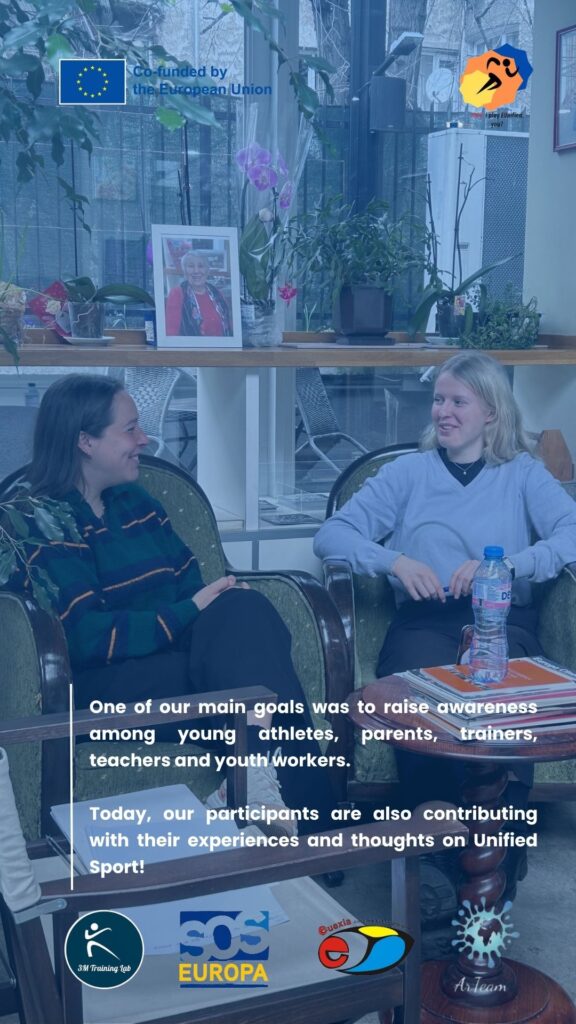
After the first activity, we got back into the topic the main outcomes of the project were reported. Next to activities, such as summer camps for children with and without intellectual disabilities, the outputs also include a state of the art summary on integrated sports concerning people with intellectual disabilities and interviews with children, trainers, educators and volunteers who took part in the project from all participating organizations. To add other perspectives to that collection members of each organization got together in mixed teams and planned, prepared and filmed interviews of their own. While doing so, we had the chance to simultaneously share their perspective with a partner from a different country, talk about personal experience with the project and form individual bonds with our partners.
After all tandems finished filming their interviews, those were shared with the entire group. On the one hand the content of the interviews presented another, more personal outlook on the results of the project, on the other hand it was also interesting to see what different filming approaches different groups took.
The final activity of the meeting was focused on the sustainability of the project. How can a longer lasting impact of the project be ensured? It is to be hoped that through various measures more people in the local communities can benefit from the outcome of the project. In order to ensure that result, we split the target group into three subgroups: the children, the parents and the teachers or coaches. Our main idea was to organize community events in schools and sports clubs that might include training sessions for children where they get to know a new sport along the lines of Unified Sports, as for example basking. During these Training Sessions, professionals in the field of basking can work together with teachers or coaches in order to introduce them to the Unified Sports approach. Then, some other ideas were to organize sports tournaments later the same day to which we also invite parents to watch and socialize with each other. That way, they can equally see first hand the positive influence integrated sports has on their children and connect with each other, share their experience and learning in the field of integration. However, we also put emphasis on the fact that many people won’t have the opportunity to attend in person, which is why a life stream of the event and information sessions online could be a beneficial accompaniment to said community event.